Some years ago an elfin man approached me as I walked along a boulevard in Ho Chi Minh City, Vietnam. He could see I was puzzled and wanted to help. What did I need? Holding out my handfull of trash, I pantomimed dumping it, then shrugged my shoulders and swept my hand in a semicircle to indicate my search for a trash bin. He pointed to the street pavement. No! I shook my head. Yes! he replied with a nod. Springing forward, he grabbed the trash from my hand and threw it on top of a pile at the curb then, flashing a huge grin, turned on his heel and ambled away unconcernedly. Had it not been tossed upon a fetid, stinking garbage heap I would have picked it back up.
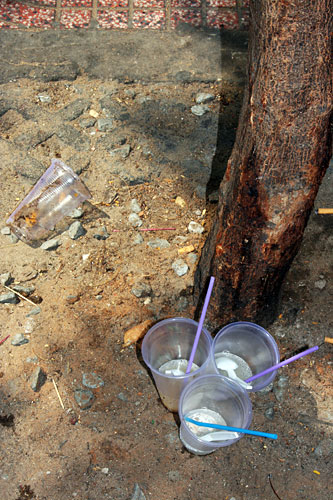
Later that same afternoon I came back to the same neighborhood after a day of traipsing around old Saigon and noticed a woman clad in a green smock and conical straw hat pushing a two-wheeled cart. Every few feet she stopped and bent to the asphalt with her hand broom of twigs to sweep up piles of trash and deposit them in her bin. The pile that had horrified me earlier in the day was long gone, and I suddenly realized that my trash was her job security.
Flash forward to 2010 and my four months of travel around Mexico. A beach bum from way back, I was stunned by the dazzling white sands and crystalline turquoise waters of the Yucatan. The beaches of Tulum and Playa del Carmen are among the most magnificent in the world. As I traveled further south to a largely undeveloped part of the peninsula, mile after mile of exquisite beaches stretched as far as I could see. Unfortunately, so did piles of rubbish. Shampoo bottles, shoes, needles, plastic containers of all kinds had washed up just above the high tide mark; where there were no houses or resorts there were no efforts to clean it up and in places the trash was a foot deep. At the southernmost point of the Yucatan I rolled into Xcalak, a sleepy town best known for its diving and deep sea fishing, and put down roots for a few days.
I brought up the subject of litter with the managers of Casa de Suenos Resort, who insisted that it did not originate in Mexico. Although some claim it comes from cruise ships that dump their trash at sea, current regulations for the cruise ship industry require weighing of the trash when ships return to port. Using available data about the average number of pounds of trash generated per person at sea, a formula is applied according to how many passengers were aboard. If the load is light, the cruise line is subject to severe financial penalties. The more commonly accepted explanation is that currents wash trash up from Central and South America and as evidence that the theory is sound, the resort manager produced a yellow hard hat he had picked up on the beach. Scrawled across the front were the words “Panama Canal.”
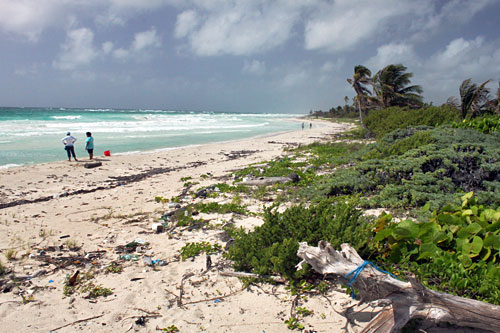
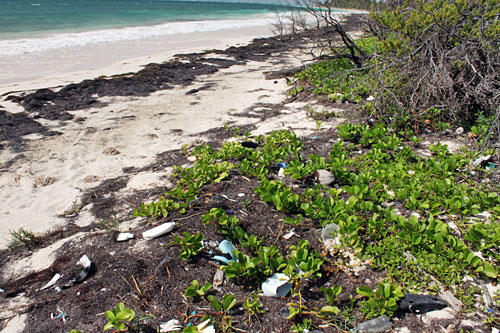
For the past several months I have been back in Asia, where the problem is as severe as anywhere in the world. To a large degree I have learned to look past the garbage; though I still cringe each time someone leans across me to toss their trash out of a bus window, I find myself reasoning that even the plate is made from biodegradable palm leaves. Rather than being appalled, I am simply chagrined when I encounter heaps of trash like the ones around Durbar Square in Kathmandu, Nepal. Last fall, after spending a few days in the cacophonous capital city I made my way to Pokhara where, despite its severely polluted lake and landscape littered with plastic bottles and bags, I fell in love. I planned for three weeks and stayed three months, and it was in Pokhara that I began to understand how the trash problem came about.
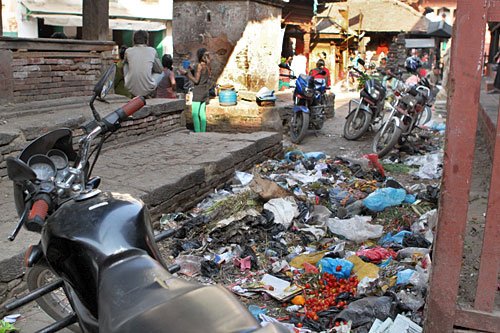
One day last fall I stopped to chat with a group of students who were gathered around a vendor selling oranges. Nepal grows the most delicious oranges in the world, tiny bundles of sweetness so small that four can fit in the palm of my hand. I bought a few, zippered off the smooth skin of one, tossed it into my mouth whole and let the taste of sunshine trickle down my throat. Then I looked for a waste bin which, of course, was nowhere to be found. The kids laughed at me, cavalierly telling me to toss the peels on the ground. No! I may not be as shocked by trash these days but I still refuse to add to the problem.
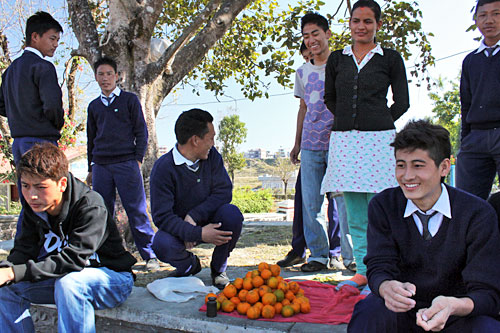
Seeing my distress, the kids tutored. “It goes back into earth. Make orange sweet.” It was like a light bulb going off in my brain. For hundreds of years Nepalis have been recycling organic waste. Even today it is common to see men and women walking with five-gallon buckets, picking up buffalo and cow dung for use on the fields. For centuries their waste was all organic; there were no plastic bottles, inorganic packaging, no batteries or cell phones. Then, in the early 1950’s Nepal opened its borders to foreigners and money from NGO’s and INGO’s flooded into the country. Along with money came the modern world of packaged products and gadgets. Unfortunately, no one thought to educate Nepalis about inorganic waste and as a result, it was thought of and treated no differently than organic trash.
I don’t buy into the argument that eliminating trash on the ground will take away jobs; certainly jobs in the recycling industry could be created to replace those of trash collectors. What I do know is that changing the attitudes of peoples who have thought about trash as a resource for as far back as history has been recorded will take time and education, along with development of industries to manufacture goods from recycled materials. With no end use market, the process is doomed. Yet I do see progress. In Pokhara, one local businessman is now delivering five-gallon bottles of purified water to homes and businesses. Hotels who have opted in to the program are offering guests refills for half the price of buying a new bottle of water, and the larger bottles are picked up, sterilized, and reused. As for organics, I’m not sure I think it should change. I devoured my last orange that afternoon, hesitated for a moment, and then threw my peels into the field next to the road. The kids beamed their approval.

I would like to see a plastic bag ban in Laos.
Such a shame how people can easily throw their thrash without considering their effects to the environment.
I just saw the inorganic/organic trash cans in Guadalajara today and was stoked! I already cringe when people just dump. Beautiful cathedrals have waste all over the front.
I can not believe what you just described!
On a recent trip to Mexico I saw organic and inorganic bins all over its major cities. It just about blew my mind. If a country such as Mexico can have these improvement on a national basis why can’t the USA?
Lovely post, Barbara. I’ve yet to visit a country with much of a trash problem yet, but your thoughts about how this problem came about make a lot of sense. Food for thought, thank you.
Benjamin
Hi All: We definitely have a long way to go as a world community where
education about trash is concerned, but if the comments I am receiving are
any indication, there is a lot of support for changing the trash situation,
even from people in developing nations. Gives me great hope.
this is the same situation here in the philippines as well, there’s alot fo inorganic trashes that are thrown everywhere by us(even me is sometimes guilty opf doing it)… as time goes by though we’re all learning the importance of keeping our environment clean…
I was in Lebanon in Saida and there is a huge pile of trash the size of a mountain on the beach. It’s now all eroding away and washing out to sea leaving it deposited in Greece and up the shore in Lebanon. Very sad. Getting people to change their litter habits is a mountain of a problem. But when I travel I do my best to at least be an example. Nice piece Barbara!
I hope the regulations on the cruise ships works, It’s kind the sad that other people’s trash from far away will land in a paradise like this.
Suggestion: go to Japan, you choose the place and then write something about trash 😉
Hi Catalin: I’m a bit confused about your comment. Does it mean that there
is a lot of trash in Japan? That’s one country Ive never been to, but I have
always assumed it would be very clean?? Or do you mean there is no trash in
Japan?
Your second guess is the right one (of course you realize I am not talking about the recently affected areas). Though they have no (or rarely have) garbage bins on the streets, you can barely find trash there. It is one of the cleanest countries in the world.
Catalin, you’ve restored my faith in my vision of Japan. Thank you. I can’t
say I’m surprised; I would have expected it to be sparkling clean.
Anytime 🙂
I agree that education is key. In Israel twenty years ago you could estimate how long someone was sitting at a bus stop by the height of sunflower shells on the ground. Worse, hiking trails and beaches were always littered with snack bags and soft drink cans. The problem still exists but gone is the mentality of throwing everything on the ground. Proper disposal, recycling and using reusable bags for shopping is being taught from a very young age. There is still much to be done but the streets and trails are much cleaner now than in the past.
Hi Sarah. What a stunningly visual sentence: “In Israel twenty years ago you
could estimate how long someone was sitting at a bus stop by the height of
sunflower shells on the ground.” You must be a travel writer 🙂
Very interesting.
If you saw the parks near where I live after people have been sitting out on a weekend evening you’ll find plenty of rubbish, but we can afford to employ people to clear it up and education programmes to teach us not to litter our streets.
So Heather – does that mean that even after throwing money at education on
this issue, people STILL leave their litter in the parks? That IS
disheartening!
When it comes to organic waste, if there isn’t a bin and there is clear earth (as opposed to concrete as far as the eye can see), then I’ll throw it on the ground, as it biodegrades and goes back into the system. Plastics and non-biodegradables, however, I find harder to deal with. I live in Italy, where there is (considering it is a developed country) a shocking lack of awareness about rubbish. The beaches around me in Calabria are covered in rubbish, and there is no recycling system in my town. Rubbish is collected in large dumpsters on the street, but people are pretty cavalier about it round here. I saw one man drive up to the dumpster with a few bags of rubbish, climb out of the car and drop them in. He then got back into the car and drove 20 yards before slinging a plastic bottle out of the window onto the pavement. Unfortunately laziness seems to drive most of us when it comes to dealing with rubbish. Education, as others have mentioned, does help, but it’s a slow process. I’m waiting to see whether Italy’s recent clampdown on plastic bags will do anything. Here’s hoping …
Katja: I’m back in Nepal at the moment and WISH the government would
consider a ban on plastic bags, which, along with bottles, are at least 75%
of the problem. Good for Italy for at least beginning to address the
problem.
*sigh* There’s nothing more frustrating to me than seeing trash on the ground. It was driving me nuts one time we were in Jakarta stuck in a traffic jam and the car in front of us rolled down their window and dumped out a plastic bag filled with their trash. I’d like to think if only more trash cans are readily available – people will have less excuse not to use them.
to me, orange peels or banana peels to the ground are ok, since they’re bio-degradable. but seeing plastics everywhere is just wrong. i grew up in the philippines where littering is a notorious habit of people there. but when i was in school, we had a ‘no littering program’ that is part of a graded conduct (we can get A’s, B’s, F’s etc). older filipino generations had a propensity for throwing trash everywhere, but the younger kids now are getting better educated about this stuff. so slowly, there is a shift in core practices. sadly, it will take a long time before we all turn out to be as disciplined as Singapore.
Hi Jen: True, but it SO encouraging to hear that this is being taught in the
schools. In a generation you will have a much more eco-conscious population.
Tricky subject, isn’t it. It’s been on my mind a lot of late, as some of my favorite beaches here are in a similar state to that one in Yucatan, (not the main, tourist beaches, mind, town councils are prepared to clean up after tourists, but not after “their own”). Although this island is closer to attitudes in mainland Europe than developing Asia, it does fall somewhere between the two, there is still a great deal of education required, but as a foreigner it’s hard to interfer. Nevertheless I think it’s essential if you care. Explanation rather than anger is required, of course, and that is so hard when it’s a topic which means a lot to you.
Barbara, this is a really illuminating post that reinforces how interconnected we all are–I was struck by the image of the Panama hard hat floating ashore. When I spent time visiting a number of cenotes on the Yucatan, a Mayan man I met told me there is a theory that the ancient practice of sacrificing humans in these wells contributed to the downfall of that civilization, poisoning the water system. Who knows if that is true but there is no question our actions affect one another, that there is a far-reaching ripple effect. Thanks for enlightening me. Meg
I’d never thought about trash being a source of future nutrition for the soils and hence people are programmed to “litter” organic waste. I have the strongest feeling with water bottles. While I don’t buy them at home, I have to have some access to clean water when I travel. I hate buying bottled water because the bottle is so difficult to dispose of and while some places are providing refills and there are some OK solutions for sterilising water, I cannot believe how much rubbish on beaches in Asian countries seems to be a combination of plastic wtaer bottles and plastic bags. Truly insightful article.
Thank you Mark. Like you I buy bottled water when I travel in Asia but feel so guilty about it. In Pokhara it is a terrible problem and so I do my little bit by staying at a guest house that let’s me refill.
Another wonderful post, Barbara. I especially loved the simple but wise statement by the kid who said, “It goes back into earth. Make orange sweet.”
I also feel guilty about my trash while traveling. I helped clean up a beach in Panama of trash. Some things were buried pretty deeply in the sand! I think a lot of the trash does float in from other places, but you see trash everywhere on the ground in Panama. Also in India, there were hardly ever trash bins along the roads. We would look around for them but instead we’d only find piles of trash. It’s a difficult issue.
I’ve experienced a similar problem in Africa as well. Before the introduction of plastic and containers, everything would be organic waste. It was no problem to throw it on the ground. It’s difficult to change that mindset without encouragement by the government and educational campaigns.
I THANK YOU FOR BRINGING THE GARBAGE PROBLEM IN NEPAL . I THINK WE ALL NEPALESE MUST CHANGE .
Thank you decide4kamal. The first step is always becoming aware of the problem and willing to change. If you are any indication the future will be much better.
Hi Barbara, nice post. I can really relate with you in the constant dilemma whether or not I should throw my garbage wherever I can, when I cannot find a trash-can, especially when I’m travelling abroad. It always seems so unfair as a visitor to leave my waste behind, but, as you know, sometimes there is simply no choice.
I lived near Tulum for many years, and, using a place I know well as example, I’ll like to highlight another issue with garbage, probably the biggest one: waste management. As you mentioned in your post, unless there is a fancy resort or a villa on the beach, nobody takes care of the litter brought by the sea. The main problem of Mexico and many others countries though, is what happens with garbage when it gets picked up.
In the Yucatan peninsula, for example, the wastes simply get dumped in a huge hole in the ground. As you probably know, underneath the yucatan peninsula runs a tremendous amunt of underground fresh water rivers, hundreds of miles of caves all connected to eachothers due to the carsic geo-morphology of the region. Now, it doesen’t take an engeneer to understand that all the garbage is eventually going to end up in the fresh water system causing a catastrophic impact on the environment. The point I’m making? Well, I absolutely understand your concerns and I will always encourage “environment conscious” behavior to every traveller, but I also think that, unfortunately, finding a bin, most of the time, it’s only good for our conscience but not necessarely the solution of the problem.
Happy travels,
Stefano
Hi Stefano: Thanks so much for your insightful comment. I am fully aware of
the geology of the Yucatan but had no ides that trash was being disposed of
in big holes in the ground. I really should have guessed this; such a poor
country has few resources to handle it in a more eco-friendly manner. The
best possible scenario would be for each of us to have compost heaps where
the organic material would return to earth. Of course, where does that leave
us as travelers? In a perfect world….
Hi, I think you’ve made a very important point about the people not being educated about the different organic and inorganic trash.
Nothing can be done about it without proper education whether it’s in mainstream education or even just trying to inform a person who might not know better why it’s bad and how its harmful.
I come from India and though I always try to dispose off even fruit peels in the dustbin like you’re written here, I am very aware of the severe garbage problem we have, but I can’t blame the people entirely either as I understand the root cause of this and many other probems in our country comes from lack of widespread education.
I’m glad that your post brought points from different views as compared to some other posts I’ve read from Travel bloggers who just discuss the ‘Trash problem in India’ without any clear or deep understanding of it. It’s easy to pity or even berate the people but to understand the issue takes a different level of effort.
Thank you so much Lavanya. Although I’m a perpetual traveler, I find that
the longer I travel, the slower I go. Staying places for longer stretches
allows me to meet local people and at least begin to understand something
about the culture. I appreciate your remark a great deal.
I saw your comment on Twitter about the post on 501Places and I left a comment there.
It’s still in moderation, so it is not up yet, but I concluded by saying that I agree about education being the key but that for what it is worth, I think that fairer societies are the basis of a caring society, and all the education in the world won’t necessarily change the attitude of someone who doesn’t identify with the society in which he or she lives.
I wholeheartedly agree David, but it does seem there is a grand movement
afoot for the common people to take back their nations, after which they
feel empowered and a “part of.” I only hope it continues.
Yes, let us hope. So many things could be put right with a paradigm shift like this.